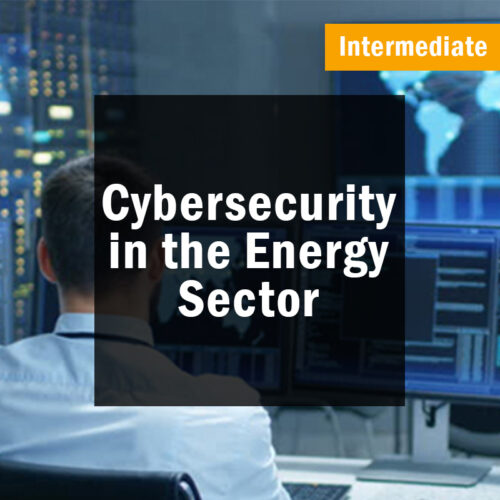-
 This certificate gives you unparalleled insight into the fundamentals of power systems, from direct to alternating current, active to reactive power, and more. You will explore frequency control, how active demand and storage can support the system, and the future evolution of the electricity grid. And you will emerge with a rock-solid understanding of the key issues at play.
This certificate gives you unparalleled insight into the fundamentals of power systems, from direct to alternating current, active to reactive power, and more. You will explore frequency control, how active demand and storage can support the system, and the future evolution of the electricity grid. And you will emerge with a rock-solid understanding of the key issues at play. -
 This certificate has been designed as an introduction to the integration and regulation of different energy systems. You will learn how energy vectors – fuels, electricity, and heating – interact and how to find added value at the interfaces between them. You’ll also build insights into the ways in which energy systems connect to other infrastructures, such as data networks, water, and transportation systems. And you will learn about how consumer psychology and society have a role in building a more sustainable, reliable, and cost-effective energy system.
This certificate has been designed as an introduction to the integration and regulation of different energy systems. You will learn how energy vectors – fuels, electricity, and heating – interact and how to find added value at the interfaces between them. You’ll also build insights into the ways in which energy systems connect to other infrastructures, such as data networks, water, and transportation systems. And you will learn about how consumer psychology and society have a role in building a more sustainable, reliable, and cost-effective energy system. -
 This mini-certificate explains how a lithium-ion cell can be designed, sized, and produced for a specific capacity and energy. The key steps in the selection and production of the main components of the cell, i.e. electrodes, separator, and electrolyte, are discussed. The slurry formulation, mixing, coating, drying, calendaring, cutting, stacking, electrolyte formulation/injection, sealing/packing, and formation cycles are detailed both in terms of machineries and the processing parameters.
This mini-certificate explains how a lithium-ion cell can be designed, sized, and produced for a specific capacity and energy. The key steps in the selection and production of the main components of the cell, i.e. electrodes, separator, and electrolyte, are discussed. The slurry formulation, mixing, coating, drying, calendaring, cutting, stacking, electrolyte formulation/injection, sealing/packing, and formation cycles are detailed both in terms of machineries and the processing parameters. -
 Sponsor-level access to the Soteria Consortium E-Bike Best Practices Project
Sponsor-level access to the Soteria Consortium E-Bike Best Practices Project- Listed as a Sponsor on the website and the final report
- Attend monthly project reviews
- Receive monthly interim-reports
- Provide input into the project execution, including tests performed
- Given a comment period after the reports are produced to provide input and improve reports before publication
- Includes 1 year of Megawatt-level Soteria BIG access for new members, or $2,000 credit towards existing membership
-
 Participant-level access to the Soteria Consortium E-Bike Best Practices Project
Participant-level access to the Soteria Consortium E-Bike Best Practices Project- Attend monthly project reviews
- Receive monthly interim reports
- Provide input into the project execution, including tests performed
- Includes 1 year of Megawatt-level Soteria BIG access for new members, or $1,000 credit towards existing membership
-
 The E-Bike Batteries: Design Guidelines for Safety is a comprehensive standard developed by Soteria and industry partners to define best practices and advanced features for safer e-bike battery packs. It provides practical guidance for manufacturers and auditors to design, evaluate, and certify packs that exceed today’s baseline safety levels.
The E-Bike Batteries: Design Guidelines for Safety is a comprehensive standard developed by Soteria and industry partners to define best practices and advanced features for safer e-bike battery packs. It provides practical guidance for manufacturers and auditors to design, evaluate, and certify packs that exceed today’s baseline safety levels. -
 This certificate aims to equip organizations with knowledge and skills to evaluate IT risks and typical vulnerabilities in the context of energy systems. Methods to avoid attacks, amongst other things exploiting human factor related risks, are described and learners will get to know approaches for dealing with security /privacy issues when designing energy data systems (Security /Privacy-by-Design). Imparting an overview of the European legal frameworks and a deeper look into country-specific regulation that have to be considered while building smart grid business models.
This certificate aims to equip organizations with knowledge and skills to evaluate IT risks and typical vulnerabilities in the context of energy systems. Methods to avoid attacks, amongst other things exploiting human factor related risks, are described and learners will get to know approaches for dealing with security /privacy issues when designing energy data systems (Security /Privacy-by-Design). Imparting an overview of the European legal frameworks and a deeper look into country-specific regulation that have to be considered while building smart grid business models. -
 This mini-certificate discusses different methods for battery testing. The importance of testing, related standards, needed testing infrastructure and analysis tools are individually tackled. This series also highlights how the output of battery testing is viable for battery modelling that supports the battery use phase and can possibly be implemented on battery management systems.
This mini-certificate discusses different methods for battery testing. The importance of testing, related standards, needed testing infrastructure and analysis tools are individually tackled. This series also highlights how the output of battery testing is viable for battery modelling that supports the battery use phase and can possibly be implemented on battery management systems. -
 Equip yourself with essential skills in battery technology through this comprehensive certification. Designed for professionals in renewable energy, electrical mechanics, and engineering, this course covers designing, operating, testing, maintaining, and replacing battery cells and packs. Gain practical experience, learn to choose the right battery technology, and ensure safe handling and disposal of battery systems. Stay ahead in the evolving battery industry with this critical certification.
Equip yourself with essential skills in battery technology through this comprehensive certification. Designed for professionals in renewable energy, electrical mechanics, and engineering, this course covers designing, operating, testing, maintaining, and replacing battery cells and packs. Gain practical experience, learn to choose the right battery technology, and ensure safe handling and disposal of battery systems. Stay ahead in the evolving battery industry with this critical certification. -
 This certificate empowers to expertly assess the challenges, the main drivers and the business opportunities of a changing energy system at different levels of the market. Participants will get a perspective on policy and regulation frameworks as a crucial part of any investment decision and strategy, and will discover real business examples from leading companies that are ground-breaking in their sector.
This certificate empowers to expertly assess the challenges, the main drivers and the business opportunities of a changing energy system at different levels of the market. Participants will get a perspective on policy and regulation frameworks as a crucial part of any investment decision and strategy, and will discover real business examples from leading companies that are ground-breaking in their sector.



